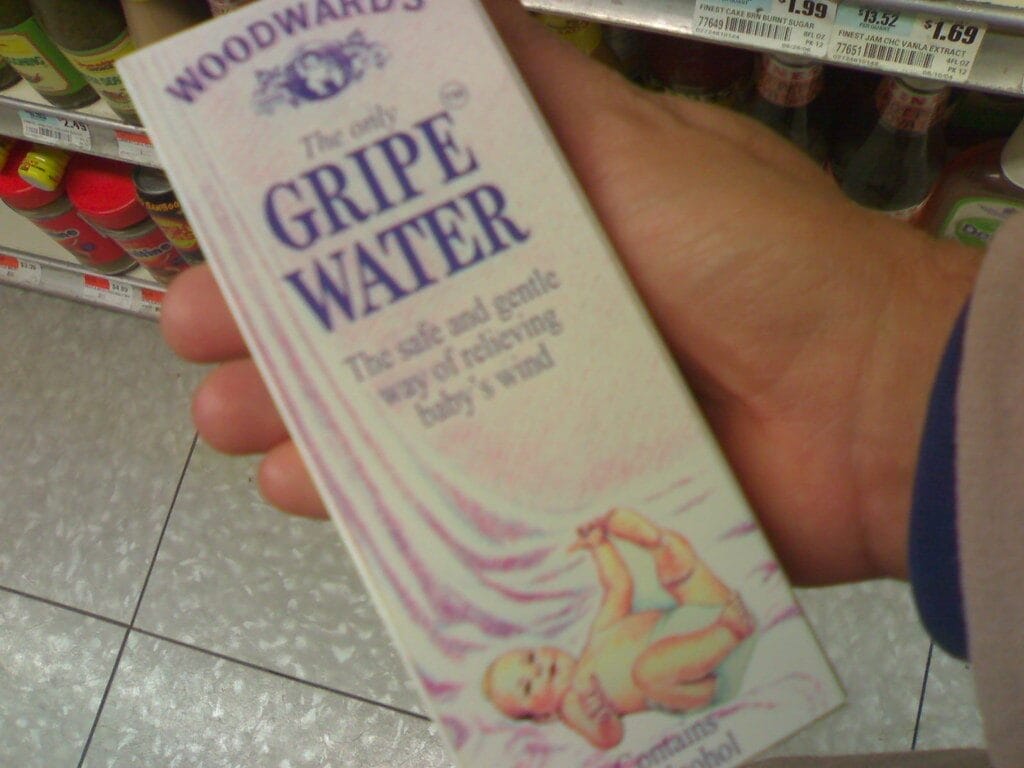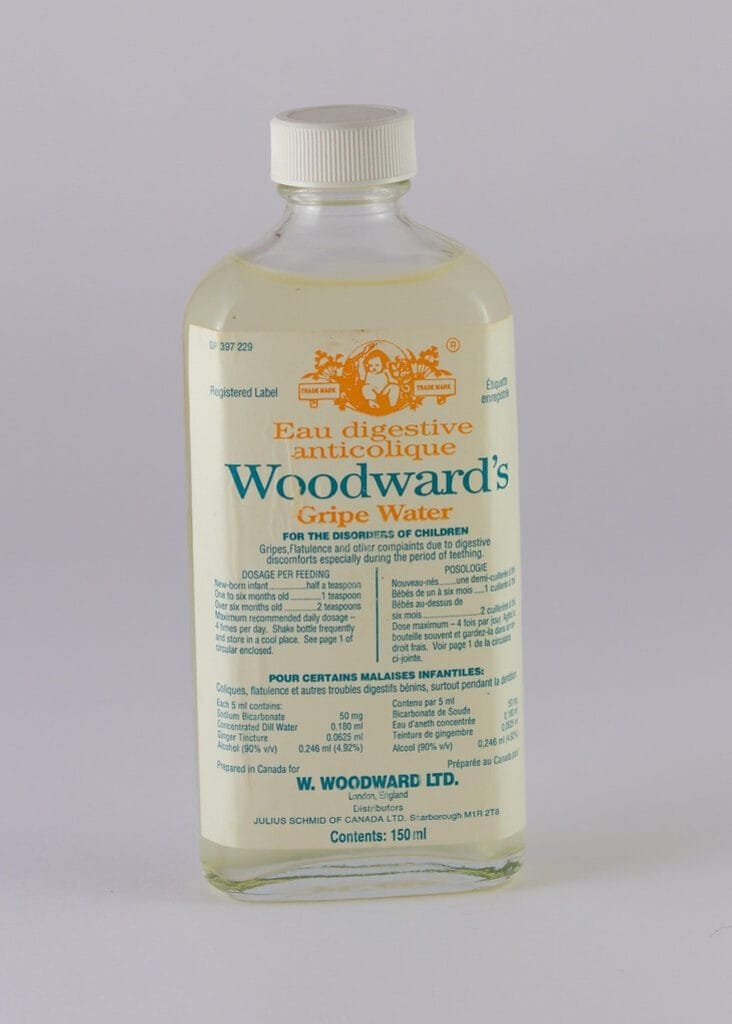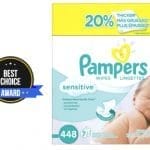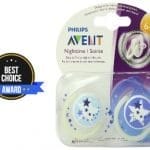5 Best Gripe Water: Ultimate Guide for Soothing Discomfort from Colics by Using Gripe Water for Babies
When your little bundle of joy turns into a bundle of wails, gripe water might just be the superhero you need. It’s like a magic potion, some say, designed to ease those tummy troubles that turn your cutie into a cranky pant. But, dive a bit into what makes this remedy tick, and you’ll see it’s not all smoke and mirrors—there’s some solid science behind it.
Gripe water has been around the block, helping parents through the woes of colic, gas, and hiccups. Before you go dashing to the store, though, it’s worth figuring out what’s in this mystical concoction. Turns out, not all gripe waters are brewed the same, and choosing the right one can be as crucial as the decision between superhero capes.
An Introduction to Gripe Water: What Is It and How It Helps
Imagine you’re trying to soothe a fussy baby, and someone hands you a bottle labeled “Gripe Water.” This elixir, friends, is essentially a gentle blend designed to ease infants’ digestive discomforts. Think of it as the peacekeeper during those long, tough nights. It’s like having a secret weapon in your parenting arsenal.
The magic behind gripe water lies in its ingredients—usually a combo of herbs and water. It’s all about turning those cries into contented sighs, helping babies deal with gas, colic, and hiccup battles. Just remember, while it can be a game-changer, consulting your healthcare provider is step one. They’ve got the playbook, after all.
The Origins and Uses of Gripe Water
Rolling back the clock, gripe water made its grand entrance in the 19th century. Originally, it was a concoction of alcohol and herbs—yes, you read that right, alcohol. Thankfully, the recipe has come a long way since then. Today’s versions are all about soothing herbs and are alcohol-free, so no need to worry about the baby’s first pub visit.
These days, gripe water is the go-to for battling the trifecta of baby woes: colic, gas, and hiccups. It’s like a comforting blanket, wrapping those tiny tummies in relief. Whether it’s an age-old recipe passed down through generations or a modern take, its essence remains the same—helping little ones find their smiles again.
Gripe Water Ingredients: A Closer Look
Peeking inside the bottle of gripe water, you’ll find a variety of ingredients. Common sightings include ginger and fennel, nature’s answers to easing digestion. No artificial flavors or colors here—just Mother Nature’s best. Labels might read like a garden party guest list, but each herb serves a purpose, aiming to bring peace to tumultuous tummies.
Among the popular kids on the block, Mommy’s Bliss Gripe Water gets high marks for its blend of organic ginger and fennel. It’s like the gentle pat on the back that helps everything go down smoothly. And when it comes to remedies, this one’s a crowd-pleaser, showing that sometimes, the old ways can coexist with the new, especially if they’re safe for babies.
Common Ingredients Across Brands
Walk down the gripe water aisle, and you’ll see a recurring theme: ginger, fennel, and dill make frequent appearances. It’s no wonder these ingredients are like the all-stars of the digestive world. Their job? To ease gas and soothe upset tummies. Brands might have their own secret sauce, but these herbs are the tried-and-true heroes.
While the ingredients list might read like a witch’s brew, there’s no hocus-pocus about its intentions. Each ingredient aims to bring comfort to your baby, making those first few months a little less stressful. So, next time you’re scanning labels, think of it as picking the best players for your team.
Organic vs. Non-Organic Ingredients
In the quest for the perfect gripe water, you might stumble upon the terms “organic” and “non-organic.” Here’s the lowdown: USDA Organic products have passed strict standards, ensuring that everything from the soil to the final bottle is as pure as your baby’s giggle. It’s like having a clean-eating guide for tiny tummies.
Choosing between organic and non-organic gripe water is like deciding on your morning coffee—everyone has their preference, and there’s no one-size-fits-all. What matters is finding a blend that sits well with your baby’s system and your peace of mind. In the end, happy baby equals happy life, right?
Top Recommended Gripe Water Brands
Finding the best gripe water for your bundle of joy can feel like shopping for the perfect pair of sneakers—comfort is key, and you’ve got options. Parents in the know often turn to a few crowd-pleasers that have stood the test of baby tantrums and tummy troubles.
From the all-organic, no-nonsense blends to those created with a little extra love for colic and gas, there’s a lineup of brands that have earned their stripes. Each boasts its own secret sauce of ingredients aimed at calming the storm that brews in tiny tummies. With options aplenty, making the right pick means considering what’ll suit your baby to a T.
1. Mommy’s Bliss Gripe Water: A Favorite Among Parents
Mommy’s Bliss Gripe Water is like the cool aunt or uncle who knows just how to bring a smile to a baby’s face. It’s a go-to for many parents looking to ease their little ones’ discomfort from colic and gas, and it does so with a gentle, herbal concoction. Sporting a roster of ingredients including organic chamomile and ginger, it’s like a warm hug for your baby’s tummy, calming the seas of unease.
But what really makes it a hot ticket? It’s the fact that it’s free of the no-no’s—no alcohol, no parabens, and no artificial colors or flavors. It’s like picking the healthiest treat from the menu, giving parents peace of mind while offering their infants a comforting remedy.
Why Mommy’s Bliss Stands Out
Why does Mommy’s Bliss take the cake? Well, for starters, it’s like the Swiss Army knife of gripe waters. With purified water as its base, it steers clear of the usual suspects and instead brings in the heavy hitters like organic chamomile extract and organic lemon balm extract. Each ingredient is like a key player in a dream team, working together to soothe and relax.
But that’s not all. It also features citrus bioflavonoid extract, citric acid, and potassium sorbate to preserve freshness without the funky stuff. Add in the passion flower extract, and you’ve got a bottle that’s not just about relief; it’s about giving your baby a natural skip down comfort lane. It’s the trusty sidekick parents reach for when they need to bring their A-game to battle tummy troubles.
2. Little Remedies Gripe Water: Trusted for Relief
On the other side of the tummy-trouble battlefield stands Little Remedies Gripe Water, locked and loaded to offer quick relief. This brand brings its A-game with a simple, yet effective, blend that’s got parents nodding in approval. Known for its “less is more” philosophy, it aims to tackle colic and gas without overwhelming your little one’s system.
With purified water setting the stage, Little Remedies turns the spotlight on ingredients like natural ginger flavor and agave vegetable glycerin. It’s like a soothing tune for the digestive system, offering relief without the fanfare of unnecessary additives. It’s straightforward, no gimmicks, just results.
Key Features of Little Remedies
What sets Little Remedies apart from the pack isn’t just its knack for easing gas pains. It’s the fact that it comes armed with purified water, a lineup of minimalistic yet powerful ingredients like citric acid for balance, potassium sorbate to keep things fresh, and the natural touch of ginger flavor. These components together create a symphony of relief that’s music to parents’ and babies’ ears alike.
Additionally, it’s xanthan gum that gives this gripe water its smooth texture, making it easy to swallow for the tiniest of customers. This gentle giant packs a punch where it counts, offering a trustworthy option for parents scanning the horizon for a safe harbor in the storm of colic and gas. With Little Remedies, it’s about bringing peace, one tiny tummy at a time.
3. Wellements Organic Gripe Water: The Natural Choice
When parents hear the chorus of late-night cries, they often turn to traditional remedies. Wellements Organic Gripe Water makes a splash as the go-to choice for its natural formula. Crafted with a mix of organic ingredients, it’s like giving your baby a drop of nature’s calm. It’s important to note, though, even natural doesn’t mean no-risks. Everything, including this herbal hug in a bottle, ain’t just water – it’s a significant step, especially in those precious first six months.
Yet, for many, the natural choice feels right. Wellements banks on simplicity and purity, offering peace of mind to parents cautious about what goes into their baby’s system. Remember, every tiny tummy’s tolerance is as unique as the babies themselves. That’s why it’s always a smart bet to chat with a healthcare pro before playing bartender with any gripe water, organic or not.
Benefits of Choosing Wellements
Why go for Wellements, you might ask? This formula’s packed with organic fennel seed extract and organic ginger root extract, nature’s answer to those gripey guts. Think of fennel as that chill friend who knows just how to calm a situation down, while ginger’s the one who’s always got your back when things get a bit, well, turbulent. Mixed with organic agave for a touch of sweetness, organic lemon juice concentrate for a citrusy zing, and organic glycerin for smoothness, it’s like a gourmet meal for your baby’s digestive system.
But hey, it ain’t just about the fancy organic label. These ingredients are chosen for their gentle touch on tiny tummies, potentially easing those colicky cries into coos of contentment. Plus, going organic means saying no thanks to any unwanted extras – only the good stuff makes the cut. So, if you’re leaning towards a natural option, Wellements might just tick all the right boxes.
4. Colic Ease Gripe Water: Unique Formulation
Now, let’s gab about a different player in the game – Colic Ease Gripe Water. This one’s like the outsider that rolled into town with a secret recipe. Its claim to fame? A blend that’s a tad different from your garden-variety gripe waters. With its less-is-more vibe, this solution aims to tackle those tummy troubles with a minimal but targeted approach. But listen, just because it’s good, doesn’t mean no questions asked. It’s still all about that balance, keeping babies’ well-being at the forefront.
Even with its unique stance, it’s crucial to remember that, wild as it may sound, not every colic or gas bout needs a remedy from a bottle. Sometimes, a change in the wind, like switching formulas or a gentle tummy rub, does the trick. And it goes without saying (but let’s say it anyway) – having a chat with your baby’s doc before going this route can steer you clear of rough waters.
What Makes Colic Ease Different?
Colic Ease isn’t just another drop in the ocean of baby remedies. What sets this elixir apart is its credentials, boasting a lineup of ingredients that are about as gentle as a grandma’s lullaby. This stuff is designed to soothe the storm without overwhelming the little one’s system. It’s like that one friend who’s super chill but surprisingly effective when you’ve got a crisis on your hands.
But the real kicker? It’s the specificity for us. Each component of Colic Ease is picked with a purpose, targeting different facets of digestive distress. It’s about not just calming the storm, but understanding why it’s raging in the first place. Yet, while it might seem like a magic potion, it’s wise to keep in mind, much like any choice for your child, is best served with a side of professional guidance and a hearty dollop of parental intuition.
5. Woodward’s Gripe Water
Let’s chat about a classic, Woodward’s Gripe Water, often hailed as a go-to by generations of caregivers. Known for its long history, this brand claims to ease infants’ tummy troubles with a blend that’s stood the test of time. The question is, does old school always mean it’s the right tool? With every baby being unique, what works like a charm for one might not for another. But, when you’ve got a fussy baby on your hands, and you’ve tried every trick in the book, Woodward’s might just be your next stop.
While some parents swear by it, it’s essential to remember that even natural ingredients need a hard look. Just ’cause it’s been around the block doesn’t mean it’s free of the need for scrutiny. Always loop in your doc before introducing anything new to your little one’s diet. After all, when it comes to our babies, we’re all playing the long game for their health and happiness.
Evaluating the Effectiveness and Safety of Gripe Water
So, is gripe water the magic elixir it’s chalked up to be? Before you start mixing up potions, consider this: not every hero wears a cape. Gripe water’s effectiveness can vary from one baby to another, much like how every superhero has their niche. It’s about finding what works best for your little one, with safety as the top priority.
Sifting through the claims and finding the gold can be tricky. It’s crucial to balance hope with a healthy dose of skepticism. After all, when it comes to your baby, you’re the guardian of their galaxy. Keeping an open dialogue with your healthcare provider can help you navigate these waters, ensuring your little one’s safety and comfort.
Is Gripe Water Safe for Infants?
When it comes to the safety of gripe water, it’s a bit like navigating a maze—there are lots of turns and opinions. The American Academy of Pediatrics tosses in its two cents, suggesting that while gripe water can relieve stomach discomfort, it’s not without its caveats. Ingredients matter, from avoiding dairy or soy to steering clear of certain herbal supplements.
Colic Calm and other gripe waters might tout their benefits for newborn babies and babies younger than six months, but it’s the active ingredients and potential for trapped gas relief that has parents intrigued. Yet, each bottle’s contents deserve scrutiny. Safety dances hand in hand with ingredients, so reading labels as carefully as you’d choose a bedtime story is key.
Risks and Benefits: What Every Parent Should Know
When it comes to gripe water, parents are right on the money thinking it’ll help their tiny human during those fussy times. This elixir promises to soothe colic and gas, bringing comfort to both baby and parent. However, it’s smart to play the game of checks and balances. On the plus side, gripe water can be a gentle way to relieve discomfort, especially those caused by gas pains or stomach issues. But, like crossing the street, looking both ways helps avoid any mishaps.
Now, on the flip side, not all gripe water is created equal. While some swear by its magic, it’s essential to remember that introducing anything other than breast milk to a wee one’s system comes with its own set of risks. This could mean anything from introducing allergens to disrupting the stomach’s peace treaty. It’s like adding a new player to a well-balanced team; you gotta make sure it’s the right fit. Hence, chewing over the pros and cons with a pediatrician isn’t just smart—it’s crucial.
Understanding Potential Side Effects
Peeking into the potential side effects of gripe water is like checking the weather before a picnic. You wanna know what you might be up against. Most of the time, gripe water is as safe as a soft pillow, but once in a while, it can stir up trouble. For instance, the addition of certain herbs or ingredients might not sit well with every baby, leading to allergic reactions or tummy troubles that weren’t on the day’s agenda.
Moreover, specific formulations with ingredients like sugar can turn a baby’s mouth into a 24/7 diner for bacteria, leading to tooth decay down the road. Plus, the introduction of any liquid other than milk or formula might mess with a baby’s feeding routine. Think of it as accidentally swapping your regular coffee with decaf – not harmful but definitely throws you off your game.
Professional Health Perspectives on Gripe Water Use
Professionals in the tiny human care industry tend to green-light gripe water, but with caution signs posted all around. They’re like the lifeguards at the baby pool. Most docs agree that with the right product, the freeway to soothing a baby’s discomfort is open for traffic. However, they’re also quick to flag down any product parade with alcohol, unnecessary sugars, or a funky ingredient list that reads like a chemistry exam.
And truly, the consensus includes a big shoutout to chatting with your baby’s healthcare MVP before diving into the gripe water pool. It’s not just about whether to use it, but how and when. They can offer guidance tailored to your little one’s health history and current needs, calling plays that are safer and potentially more effective than just winging it.
Natural Alternatives and Remedies
Listen, when it comes to soothing a cranky baby, sometimes the old ways ain’t the only ways. Exploring natural alternatives and home remedies might just be the ticket to peace and quiet. We’re looking beyond the bottle, folks. Whether it’s a tweak in diet or a new burping technique, sometimes the simplest changes can make all the difference for your bundle of joy.
And hey, don’t forget about the power of a good, old-fashioned hug. Sometimes that direct comfort from mom or dad can calm a storm you thought you’d never weather. It’s about keeping an open mind and trying out a mix of strategies to find out what makes your little one tick — or, more importantly, stop ticking.
Beyond Gripe Water: Exploring Other Solutions
Gripe water’s got its fans, sure, but it ain’t the only player in the game. There’s a whole world of remedies and techniques out there that might mesh better with your baby’s unique needs. Sometimes, it’s less about what you give and more about how you give—like the soothing motion of a gentle sway or the calming sound of a soft lullaby might just be the magic touch your baby needs.
Remember, every baby’s different and finding the right solution might take some trial and error. And that’s okay. Consult with healthcare professionals to navigate these waters safely. They’ve seen it all and can offer guidance tailored to your wee one’s needs. Whether it’s adjusting your diet or tweaking the nursery’s environment, a personalized approach might just be key.
Dietary Adjustments for Nursing Mothers
Here’s the deal, nursing moms: what you eat, your baby kinda eats too. Making some adjustments to your diet can sometimes soothe your baby’s tummy troubles better than anything you’ll find in a bottle. Think of it like tweaking the recipe to make the perfect dish. Incorporating foods known for their calming effects, like fennel or chamomile, might just make a world of difference to your baby’s wellbeing.
And don’t think you’ve got to cut out everything that makes life worth living. It’s more about finding balance and paying attention to how certain foods seem to rock the boat. Connect with a nutritionist or your doc to ensure you’re getting the nutrients you need while keeping baby’s tummy happy. It’s a bit like being a detective in your own kitchen.
Physical Comfort Techniques for Babies
Let’s get hands-on, folks. Sometimes all a baby needs to calm down is a bit of gentle, loving touch. Techniques like ‘the hold’—you know, that one where you gently but securely hold your baby’s chest with one hand and support their head and neck with the other—can work wonders on a fussy baby. It’s like magic, without the need for a wand.
Then there’s the power of movement. Rocking, swinging, and even gentle bouncing can mimic the coziness of the womb and help soothe your baby. Combining these physical comforts with a calm, reassuring voice can sometimes do the trick better than anything else. It’s all about that physical connection, reminding them they’re safe and loved.
When to Consider Alternatives to Gripe Water
Sometimes, despite your best efforts with gripe water, it just doesn’t hit the mark. That’s when it’s time to consider other roads to relief. It ain’t about admitting defeat; it’s about adapting to what your baby needs. If the usual suspects aren’t soothing your infant’s discomfort, it could be a hint that their tummy troubles require a different approach.
Interrupted sleep, constant crying, and that look of discomfort on their little faces can be heart-wrenching. But it also tells you, loud and clear, it’s time to explore new options. Consult your baby’s healthcare team to pin down the cause and find a remedy that fits just right. They can offer insights and options you might not have considered.
Specific Situations and Conditions
Alright, so each baby’s as unique as a snowflake, which means there’s no one-size-fits-all solution for tummy troubles. Sometimes, the cause of discomfort is more specific, like allergies or intolerances. That’s when turning to alternatives based on your baby’s particular situation can make a significant difference.
For instance, if you notice that your baby seems unusually gassy or upset after meals, it might be worth looking into whether a food allergy is playing a role. Tracking symptoms and dietary patterns can be incredibly revealing, providing clues on how to tweak your approach for the better. Remember, it’s all about the detective work.
Recommendations from Pediatricians
When in doubt, turn to the pros. Pediatricians ain’t just there for the tough times; they’re a goldmine of advice and recommendations tailored to your baby’s unique needs. They’ve got the scoop on everything from dietary tweaks to alternative soothing techniques that have worked for countless other little ones.
Consider them your partner in crime (the good kind) on this parenting journey. They can help you navigate the sea of information out there and pinpoint what’s worth trying and what’s best left on the shelf. It’s like having a trusted navigator when you’re trying to sail through foggy waters. With their help, you’ll find your way.
Homemade Gripe Water: Is It a Viable Option?
Stepping into the world of homemade gripe water is like walking a tightrope. On one hand, you’ve got parents swearing by it, saying it’s the magic potion that turned their baby’s frown upside down. On the flip side, though, there’s a whispered caution in the air, hinting at the risks of going DIY with anything that’s going down your baby’s throat.
Let’s be real here: the idea of whipping up your own batch of gripe water in the kitchen has its charm. It feels empowering, like you’re a culinary wizard concocting a brew that will bring peace to your household. But before you start playing potion master, remember that what works like a charm for some might not for others, and safety always takes the front seat in this ride.
Pros and Cons of DIY Gripe Water
Creating your own gripe water has its ups and downs, starting with the pros. You know exactly what’s going into it, which feels like a win when you’re trying to keep things as natural as possible. Plus, there’s something about making it yourself that feels like you’re giving more than just relief; you’re giving a part of your care and effort.
However, the cons can’t be ignored. The biggest downside? The possibility of introducing bacteria, causing allergies, or irritating your baby’s sensitive intestines. It’s like deciding to perform at the circus without a safety net. Sure, you might pull off a dazzling act, but the risk is always there, lurking in the shadows.
Ingredients for Making Your Own
If you decide to take the plunge and make your own gripe water, you’ll want to start with some key players on your team. Think of citrus bioflavonoid extract, organic chamomile extract, organic lemon balm extract, and organic passion flower extract. They’re like the Avengers of natural remedies, each bringing their own superhero benefits to the mix.
But remember, even superheroes need to play by the rules. Every ingredient must be measured with precision—no eyeballing it and hoping for the best. This isn’t like jazzing up a recipe; it’s about ensuring the safety and well-being of your little one.
Safety Considerations and Guidelines
Before you start brewing, you’ve got to talk to the coach, aka your healthcare provider. They’ll give you the playbook on what’s safe and what’s not. And when they do give the thumbs up, remember the golden rules: clean workspace, precise measurements, and strict adherence to guidelines. This isn’t a time for creative liberties.
And let’s not forget the 24-hour period rule. Much like glass slippers and fairytales, homemade gripe water doesn’t last forever. It’s got a shelf life shorter than a Snapchat story, so make it in small batches, ideally no more than 5 ml at a time. This way, you keep things as fresh and safe as possible, reducing any risks of a halftime fumble.
The Final Verdict: Navigating the Choice of Gripe Water
So, here we are at the crossroads, weighing the options on the gripe water spectrum. It’s a lot like choosing the right ice cream flavor; what works for one may not work for another. But in this case, it’s not just about taste—it’s about your baby’s health and happiness.
The key here is not rushing. Like a grandmaster playing chess, you have to consider every move and its consequences carefully, from the ingredients list to the seal of approval from health professionals. It’s about finding that sweet spot between efficacy and safety that brings peace to both baby and household alike.
Making an Informed Decision for Your Baby
Deciding on whether or not to use gripe water comes down to being as informed as possible. Babies’ digestive systems are works in progress, handling things as delicate as a soufflé. Introducing anything new into their diet is a big move that should be made with all the facts in hand.
It’s a team effort, one that involves close consultation with your pediatrician to understand the lay of the land. They’ll help navigate the murky waters, ensuring you make a choice that’s in the best interest of your baby’s well-being. After all, no one knows your little one quite like you and your healthcare team.
Weighing Efficacy Against Safety Concerns
When it comes down to it, balancing the benefits against potential risks is the name of the game. It’s like deciding whether to invest in stocks or bonds. Sure, one might offer quicker returns, but at what risk? Safety always comes first, especially when it’s about something as precious as your baby’s health.
Efficacy might seem like the goal, but if it compromises safety, it’s not worth the gamble. It’s about playing the long game for your baby’s health, ensuring every decision made is backed by solid advice and unwavering care.
The Importance of Consulting with Healthcare Professionals
At the end of the day, the MVP in making health-related decisions for your baby is your healthcare provider. They’re the seasoned coach with years of experience, ready to guide you through every inning, ensuring you’re making the best plays for your team.
Whether it’s gripe water, a tweak in the diet, or any other remedy under the sun, their advice is invaluable. They’ve got the playbook, the strategies, and the expertise to ensure your baby’s health and happiness are always in the best hands. So, before making any major plays, make that call to the professional—it could be the game-changer your team needs.
Wrapping Up: Soothing Your Baby’s Tummy Troubles
When it comes down to giving your little one something to ease those tummy aches and gas pains, gripe water has stood the test of time, all the way from the 19th century. Yet, it’s not some magic potion without its ifs and buts. Remember, even if it’s just a herbal remedy, introducing anything other than breast milk or formula in those first 4 to 6 months can be a bit like rolling the dice. Some babies might get relief, while others might not react as well.
For those looking for alternatives to gripe water because they’re a tad wary or found it wasn’t quite hitting the spot, there’s no shortage of routes to take. From switching up the diet if you’re nursing, to trying different gas drops or dietary supplements, the aim is the same: getting that smile back on your baby’s face. Just ensure that any path you choose is given the green light by a healthcare professional to keep things safe.
Summarizing the Best Choices for Gripe Water and Alternatives
The standout brands like Mommy’s Bliss, Little Remedies, and Wellements offer something for every nervous parent with their mix of organic and homeopathic ingredients thought to soothe the most fussy of babies. These brands boast about using ingredients that sound like they come straight out of an ancient herbalist’s book, such as ginger and fennel, believed to calm an upset stomach and ease gas pains. Yet, every bottle’s ingredient list should be eyed with caution, ensuring they align with what’s best for the baby.
Looking beyond the bottle, embracing natural and gentle alternatives to gripe water for those not quite convinced can prove just as effective. Everything from dietary changes for nursing mothers, cuddles, to paced rocking offers an avenue to bring relief to cranky infants. These methods, steeped in simplicity and love, often require nothing more than time and patience, echoing the sentiment that sometimes, the old ways might just be the gold standard.
Final Thoughts on Gripe Water as a Remedy
Gripe water, a mix of herbs and water, has been a go-to for parents dealing with a baby’s upset tummy caused by gas, fussiness, or symptoms of colic. While gripe water is marketed as a safe and effective remedy for soothing colicky babies, it’s crucial to remember the importance of gripe water administration in infants 1-6 months old being approached with care. The key is in moderation and ensuring that any gripe water choice is backed by safety and efficacy, free from ingredients that might do more harm than good.
Given the mixed opinions, it stands to reason that consulting with healthcare professionals before introducing any herbal remedy like gripe water is wise. After all, when it comes to our little ones, playing it safe is never playing it too safe. The bottom line remains: understanding your baby’s needs and comfort level is paramount, ensuring that their first foray into the world of dietary supplements is as gentle as possible.
Embracing a Holistic Approach to Baby Care
The journey of parenthood is speckled with decisions, from what to feed to how to soothe. At the heart of these choices, a holistic approach to baby care can pave the way for harmonious growth and development. By considering not only physical remedies like gripe water or dietary changes but also the emotional and environmental factors that contribute to a baby’s well-being, parents can foster a nurturing space that encourages health and happiness.
This holistic lens brings into focus the broad spectrum of baby care, where physical comfort techniques for babies, attention to the nursing mother’s diet, and the thoughtful selection of products used, contribute to the overall health of the baby. Such an approach respects the complexity of baby care, recognizing that each decision weaves into the larger tapestry of a child’s life, setting the foundation for wellbeing that extends far beyond the infant years.
FAQ on gripe water as a potential remedy for colic
Q: What is gripe water and how can it help my fussy baby?
A: Gripe water is an old-fashioned remedy made from a mixture of herbs and water, specifically designed to soothe babies with colic, gassiness, and other baby ailments. Many parents use gripe water to relieve excessive crying associated with colic symptoms.
Q: Is it safe for babies to use gripe water?
A: Yes, gripe water is generally considered safe for babies when used as directed. However, it’s essential to choose a product that is specifically formulated for infants and to consult with your pediatrician before giving gripe water to your baby.
Q: Can I give gripe water to my gassy baby?
A: Yes, you can give gripe water to a gassy baby. It can help alleviate gassiness and discomfort. Just ensure that you are using a baby gripe water product that is free from harmful additives.
Q: What ingredients should I look for in gripe water for babies?
A: When selecting gripe water, look for products that contain natural ingredients such as ginger, fennel, or chamomile. Be cautious of those containing sodium bicarbonate, as it may not be suitable for all infants. Always check the label for safety guidelines.
Q: How do I give gripe water to my baby?
A: You can give gripe water using a dropper straight into your baby’s mouth. Ensure you follow the dosing instructions on the label and consult your pediatrician for the right amount based on your baby’s age and weight.
Q: When should I give gripe water to soothe my baby?
A: You can give gripe water when your baby exhibits colic symptoms, is experiencing gassiness, or seems to be a fussy baby. It’s typically given before or after feeding to help relieve discomfort.
Q: Are there any side effects of using gripe water for babies?
A: Gripe water is generally safe, but some babies may experience allergic reactions or digestive upset. It’s important to monitor your baby after giving gripe water and consult your healthcare provider if you notice any unusual symptoms.
Q: How often can I give gripe water to my baby?
A: The frequency of giving gripe water can vary by product. Most recommendations suggest administering it up to several times a day as needed, but always follow the specific instructions on the product label or those provided by your pediatrician.
Q: Can gripe water cure colic in babies?
A: While gripe water can provide relief from colic symptoms, it is not a cure for colic. It can help soothe a fussy baby and ease discomfort, but it’s best to consult your pediatrician for comprehensive management of colic.
















